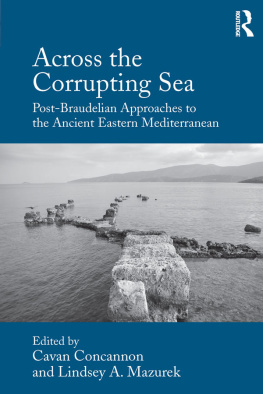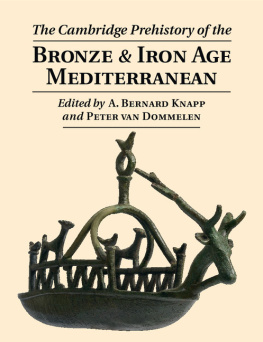Fernand Braudel was born in 1902 in Lumeville, north-western Lorraine, France. The son of a teacher, he took his degree in history at the Sorbonne in 1923. He spent much of the war as a prisoner in Germany, where he wrote most of his Mediterranean thesis. In 1949 it was published as The Mediterranean and the Mediterranean World in the Age of Philip II; it has become recognized as one of the twentieth centurys greatest books. Braudels other books include Civilization and Capitalism, The Identity of France and A History of Civilizations. The Mediterranean in the Ancient World will be his last major posthumous publication. In 1984 he was elected to the Academie Franaise. Fernand Braudel died in Paris in 1985.
Sian Reynolds has translated many of Braudels books into English. She is Professor of French at Stirling University.
Oswyn Murray is a Fellow and Tutor of Balliol College, Oxford.
FERNAND BRAUDEL
The Mediterranean
in the Ancient World
Text edited by
ROSELYNE DE AYALA and PAULE BRAUDEL
Preface and Notes by
JEAN GUILAINE, Professor at the College de France
and PIERRE ROUILLARD, CNRS
Translated from the French by
SIN REYNOLDS
With an Introduction by
OSWYN MURRAY

PENGUIN BOOKS
PENGUIN BOOKS
Published by the Penguin Group
Penguin Books Ltd, 80 Strand, London WC2R 0RL , England
Penguin Putnam Inc., 375 Hudson Street, New York, New York 10014, USA
Penguin Books Australia Ltd, 250 Camberwell Road, Camberwell, Victoria 3114, Australia
Penguin Books Canada Ltd, 10 Alcorn Avenue, Toronto, Ontario, Canada M4V 3B1
Penguin Books India (P) Ltd, 11, Community Centre, Panchsheel Park, New Delhi 110 017, India
Penguin Books (NZ) Ltd, Cnr Rosedale and Airborne Roads, Albany, Auckland, New Zealand
Penguin Books (South Africa) (Pty) Ltd, 24 Sturdee Avenue, Rosebank 1196, South Africa
Penguin Books Ltd, Registered Offices: 80 Strand, London WC2R 0RL , England
www.penguin.com
First published in France as Les Memoires it la Miditerranie by Editions de Fallois 1998
This translation first published by Allen Lane The Penguin Press 2001
Published in Penguin Books 2001
8
Copyright Editions de Fallois, 1998
Copyright the Estate of Fernand Braudel, root
Translation copyright Sian Reynolds, 2001
Introduction copyright Oswyn Murray, 2001
Preamble copyright Christopher Logue, 1999
All rights reserved
The moral right of the translator has been asserted
Except in the United States of America, this book is sold subject to the condition that it shall not, by way of trade or otherwise, be lent, re-sold, hired out, or otherwise circulated without the publishers prior consent in any form of binding or cover other than that in which it is published and without a similar condition including this condition being imposed on the subsequent purchaser
978-0-14-193722-9
Contents
| Can the spread of megaliths explain the early history of the Mediterranean? |
Illustrations
FIGURES
MAPS
Introduction
Fernand Braudel (1902-1985) was the greatest historian of the twentieth century. So universal has his influence been on the study of history since the publication of his first major work fifty years ago, that it is almost impossible for us to remember what history was like before Braudel; and for that reason we often tend to forget how important was this revolution in historical method: it takes a discovery like that presented here, of a lost work by the master on his favourite theme, to remind us of our debt to him. The purpose of my introduction is therefore to describe the life and work of Braudel, and to explain in what ways this book exemplifies his approach to history.
Braudel liked to think of himself as a typical Frenchman from the provinces: in his memory he belonged to a peasant family from Lorraine on the borders of France and Germany, where because of poor health he had indeed spent his early years in the village of Lumville-en-Ornois at his paternal grandmothers smallholding, with its chickens, stone walls and espalier fruit trees, in a world which (as he described it) was still centred on the blacksmith, the wheelwright, the itinerant woodcutters and an ancient mill. The contemporary realities of industrial Lorraine and the ever-present threat from Germany were subsumed into this idyll, as was the fact that his later childhood and adolescence were spent in Paris and its suburbs, where his father was a teacher of mathematics. On leaving school, Braudel did not compete for entry to the elite institution of the cole Normale Superieure, but went to the Sorbonne, where he found himself attracted by the lectures of professors of history outside the mainstream, in economic and social history or the study of ancient Greece, which attracted audiences of between four and seven. In 1923, at the age of 21, he travelled to his first post as a teacher of history at the grammar school of Constantine in Algeria, and here he saw the Mediterranean for the first time. He had chosen resolutely to identify himself with the margins of French society and to escape from his Parisian bourgeois background to a career in the provinces.
His true intellectual formation began in Algeria, a world where a young man could take himself seriously. He turned from the study of Lorraine (which he came to think too full of national problems) to Spain, and began to contemplate a traditional historical thesis on the Mediterranean policy of Philip II between 1559 and 1574; by 1927 he was publishing reviews of books on Spanish history. But he was also fascinated by the new history of Lucien Febvre, based on the science of human geography and exemplified in a book written in 1913 but not published until 1922, La Terre et revolution hutnaine (translated as A Geographical Introduction to History (London, 1932)). Braudel read the book in 1924; but as usual his approach was cautious: it was three years before he began to write to Febvre, and their close personal friendship did not begin for another ten years. Meanwhile, in his first reply to Braudel, Febvre had planted a serious doubt about his subject of research:
Philip II and the Mediterranean, a good subject. But why not the Mediterranean and Philip II ? A much larger subject. For between these two protagonists, Philip and the middle sea, the division is not equal.
Braudel was a successful schoolteacher and was becoming known as an expert in his chosen area: in 1932 he returned to Paris, and was nominated to a series of more and more prestigious lyces; in 1933 he married one of his earliest pupils in Algiers. Then he made a decision which was to change his life: in 1935 he took the offer of a five-year secondment to the new university being established with French help at 530 Paolo in Brazil. It was a golden chance for him and for others of his generation who had not followed the easy road to break into French academic life; at least one of his contemporaries and friends in that enterprise is now equally famous the anthropologist Claude Levi-Strauss.
It was in Brazil that I became intelligent. Braudel was always an eminently practical man. He managed to rent a large mansion complete with a Chevrolet and an Italian chauffeur, from someone who conveniently spent the period of the university terms in Europe. Each winter Braudel would return to Europe and work in the archives of the great Mediterranean trading cities, such as Venice and Dubrovnik (Ragusa). In his research he was an innovator in two respects, conceptual and practical. He made the move from government archives to commercial archives; and by chance he invented the microfilm, which he used in order to copy two or three thousand documents a day, to be read during the university year in Brazil:




